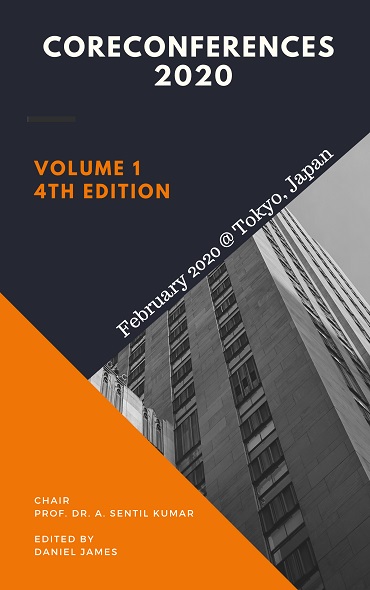- Publication Meta:Value
- Short Title:CC Batch A 2020
- Publisher:ASDF, India
- ISBN 13:978-93-88122-10-8
- ISBN 10:93-88122-10-0
- Language:English
- Type:Hard Bound - Printed Book
- Copyrights:CC Batch A Organizers/DCRC, London, UK
- Editor-in-Chief:Dr A Senthilkumar
- Conference Dates:03 - 04, February 2020
- Venue Country:Tokyo, Japan
- Submitted Papers:259
- Acceptance Rate:8.77%
- Website:www.coreconferences.com
Welcome to ASDF Electronic Digital Library!
CoreConferences 2020
CoreConferences 2020
International Conference on Global Peace 2020
Paper 010
Water Imbalances as a Source of Migration and Violence in Nigeria
Frederic Noel Kogoui Kamta1
Abstract
This paper examined the relationship between water availability, migration and conflicts in Nigeria. It examined the causes of the differences in water availability between northern, central and southern Nigeria and the human response to these differences. Data for this study were collected by interviewing local residents in northeast Nigeria but also experts in research centres and from governmental institutions in Abuja. The paper also relied on literature from various sources. The study revealed that the scarcity of water and fertile land often pushed northern farmers and Fulani herdsmen to migrate south towards the middle belt and southern parts of the country, thus mixing with people from different ethnic groups and religion. This mixture was proven to be one of the reasons behind violence, added to the fact that people are easily manipulated into conflict based on ethnicity and religion. This is often done by selfish politics who uses ethnicity and religion to create conflict which allows them to achieve their political ends. The paper recommended the industrialization of livestock production, which will reduce migration of Fulani herdsmen to the south and the relocation or creation of manufacturing industries to northern areas that will employ farmers and diversify their sources of income, hence reducing migratory trends towards South.
Keywords
Author's Profile
Author profile can be generated and linked through our partners World Book of Researchers. To include your profile online Click Here. After it is approved, please email to edlib @ asdf.res.in to create a link with all the papers.
e-AID
2020.CoreConferences.010
Cite this Article as Follows
Frederic Noel Kogoui Kamta. Water Imbalances as a Source of Migration and Violence in Nigeria. International Conference on Global Peace (2020): 07. Print.
© 2010 - by EDLIB . All rights reserved.

